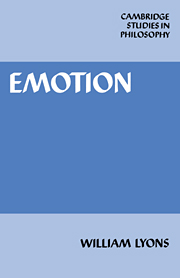Book contents
- Frontmatter
- Contents
- Preface
- Acknowledgements
- 1 Three classical theories of emotion: the feeling, behaviourist and psychoanalytic theories
- 2 A fourth classical theory: the cognitive theory
- 3 The causal–evaluative theory of emotions
- 4 The cognitive and evaluative aspects of emotion
- 5 The appetitive aspect of the emotions
- 6 The objects of emotions
- 7 Physiological changes and the emotions
- 8 Emotions and feelings
- 9 Emotions and behaviour
- 10 Emotion statements
- 11 Emotions and motives
- 12 Emotions and purpose
- 13 Blaming the emotions
- 14 Looking back: a summary
- Bibliography
- Index
1 - Three classical theories of emotion: the feeling, behaviourist and psychoanalytic theories
Published online by Cambridge University Press: 03 December 2009
- Frontmatter
- Contents
- Preface
- Acknowledgements
- 1 Three classical theories of emotion: the feeling, behaviourist and psychoanalytic theories
- 2 A fourth classical theory: the cognitive theory
- 3 The causal–evaluative theory of emotions
- 4 The cognitive and evaluative aspects of emotion
- 5 The appetitive aspect of the emotions
- 6 The objects of emotions
- 7 Physiological changes and the emotions
- 8 Emotions and feelings
- 9 Emotions and behaviour
- 10 Emotion statements
- 11 Emotions and motives
- 12 Emotions and purpose
- 13 Blaming the emotions
- 14 Looking back: a summary
- Bibliography
- Index
Summary
There are both philosophical and psychological theories which have contributed enormously to the study of the emotions. In this opening chapter I shall discuss three of these – the feeling, behaviourist and psychoanalytic theories – or perhaps more accurately three theoretical streams, as each stream comprises what might be called either several versions of a single theory or several theories which are related. There have been other theories which do not fit readily into these streams but, apart from the cognitive theory, which is outlined separately in the next chapter, I think it is fair to say that they have been less influential. The feeling and cognitive streams have been dominant in philosophy, and the behaviourist and psychoanalytic streams have dominated psychology. At any rate this and the next chapter do not make any claims to be giving an exhaustive account of theories of emotion but merely to be a discussion of these theoretical streams which could be said to be of such importance as to have the status of classical theories of emotion, and I will be confining my discussion of these theories to the classical philosophical and psychological literature on them, and the connections between them.
The point of this discussion is twofold. First, to provide the background or context into which I can place the theory whose details form the major part of this book, and thereby to make my account of emotion more comprehensible.
- Type
- Chapter
- Information
- Emotion , pp. 1 - 32Publisher: Cambridge University PressPrint publication year: 1980
- 1
- Cited by



